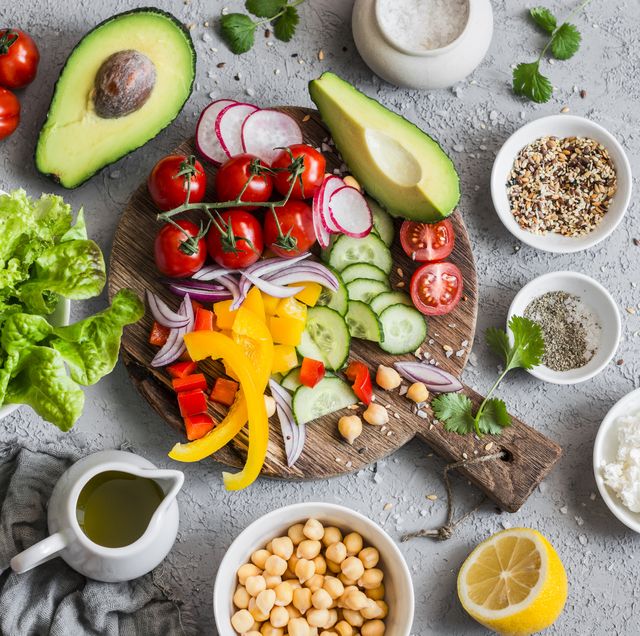Top Healthy Foods To Eat Everyday(2024 Guide)

Top Healthy Foods To Eat Everyday: If you want to enhance your general health and lower your chance of developing diseases like heart disease and cancer, adopting a healthy diet is an excellent first step. There are several meals, according to experts, that individuals ought to consume daily. They include a range of veggies and lean proteins. Furthermore, eating foods like olive oil, almonds, and berries can help people reduce their chance of developing certain chronic diseases. EnoughInfo.com

These 52 healthy foods should be part of your daily diet.
FAQs & Answers
1, Which fruit provides the most energy?
Oranges, grapefruit, and lemons are examples of citrus fruits that provide an energy boost in addition to several health advantages. Citrus fruits include vitamin C, which is crucial for the body’s formation of amino acids, which are the building blocks of molecules that control energy levels.
2, Does honey give you energy?
Both rapid energy and carbohydrates can be found in honey. Since carbs are the main source of energy for the body, each tablespoon of this food contains about 17 grams of carbohydrates and 64 calories, making it perfect for a quick pick-me-up.
3, What foods to avoid that make you sleepy?
Many meals are linked to adverse sleep effects. Caffeine, alcohol, spicy foods, high GI foods, fatty foods, and processed foods are a few of the more popular ones. It is possible to increase the likelihood of getting a good night’s sleep by being aware of these foods and avoiding them before bed. 29 Sept 2021
Vegetables
Leafy greens
Vegetables that are dark in color and leafy in appearance are extremely nutrient-dense, boasting a large variety of vitamins and minerals despite their low caloric content.
Vitamins A, C, E, and K, along with fiber, iron, magnesium, potassium, and calcium, are abundant in dark leafy greens like spinach and kale. Folate and B vitamins, necessary for healthy red blood cells, and fiber, vital for digestive health, are abundant in dark green leafy vegetables like spinach, Swiss chard, kale, and Brussels sprouts. How To Control High-Blood Pressure(The Ultimate Guide)
They also include high amounts of lutein and beta-carotene, two nutrients crucial to maintaining healthy eyes. Sulforaphane, a molecule found in broccoli, has been shown to provide protection against some types of cancer. The high levels of vitamin C in it make it a useful tool for maintaining a healthy immune system.
Bell peppers
Bell peppers are available in a rainbow of colors, from red to yellow to green. They’re deliciously crunchy and sugary, plus they’re packed with healthy nutrients like vitamin C and antioxidants.
Read Also: 185+ Deep Love Messages For Her (Melt Her Heart)
Broccoli
Raw or cooked, the cruciferous vegetable broccoli has a pleasant flavor. As compared to other vegetables, it has a relatively high level of protein and is also a great resource for fiber and vitamins C and K.
Carrots
To put it simply, carrots are a popular root vegetable. They have a satisfying crunch and are full of healthy minerals including fiber and vitamin K.
Carrots have a lot of beneficial antioxidant carotene.
Cauliflower
The cruciferous vegetable cauliflower has several uses. It’s versatile as a nutritious ingredient and enjoyable on its own. How To Strengthen Family Bonds(Ultimate Guide)
Cucumber
One of the most widely consumed veggies is the cucumber. They contain primarily water and are thus very low in carbohydrates and calories. They are low in calories and high in fiber, but they also contain a variety of vitamins and minerals in trace levels.
Garlic
Garlic has amazing health benefits. The organosulfur chemicals it contains have profound biological effects, such as boosting the immune system.
Kale
Its high levels of fiber, vitamin C, vitamin K, and other minerals have contributed to kale’s rising popularity. Using it in salads and other meals is a great way to give them a delicious crunch.
Onions
Because of their pungent flavor, onions are frequently used in cooking. Many bioactive chemicals found in them have been linked to positive health effects.
Tomatoes
Despite being a fruit rather than a vegetable, tomatoes have been given the vegetable label. They’re delicious, and you can feel good about eating them because they’re packed with minerals like potassium and vitamin C.
Fruits & Berries
Berries
Strawberries, blackberries, blueberries, and other berries are nutrient-rich and high in fiber, which supports a healthy, functional digestive system. How To Work With Someone Who Hates You
Berries are also a good source of vitamins, minerals, and antioxidants, which work to prevent the harm that free radicals may do as well as ailments like heart disease and neurological conditions.
Avocados
Avocados include several nutrients that are good for the heart, intestines, brain, hair, and skin. They are also anti-inflammatory, filling, and anti-inflammatory.
Avocados are rich in monounsaturated fat, which helps to raise levels of good cholesterol by lowering levels of low-density lipoprotein (bad) cholesterol and regulating blood sugar.
They are also rich in magnesium, which promotes nerve and muscle function and lowers stress hormones while promoting sleep, and potassium, which helps maintain blood pressure.
Apples
Apples are a great source of fiber, vitamin C, and antioxidants that can help decrease cholesterol, reduce inflammation, as well the risk of type II diabetes and some types of cancer.
Since they encourage feelings of fullness, apples decrease overeating and aid in weight reduction.
Bananas
Potassium is abundant in bananas and necessary for sustaining normal blood pressure. In addition to being satiating, bananas can give the body long-lasting energy.
Blueberries
Apart from their delightful flavor, blueberries are also a very potent antioxidant source.
Oranges
The vitamin C content of oranges is well-known. In addition, they contain a lot of beneficial antioxidants and fiber. How to travel to Guinea (Visa-free Guide)
Strawberries
Strawberries are a healthy, low-calorie, and low-carbohydrate option.
In addition to being extremely nutritious (rich in vitamin C, fiber, and manganese), they also happen to be extremely tasty.
Read Also: Health Benefits Of Cinnamon(All You Need to Know)
Extra nutritious fruits
Cherries, grapes, grapefruit, kiwi, lemons, mangoes, melons, olives, peaches, pears, pineapples, plums, and raspberries are some more examples of nutritious fruits and berries.
Meats
Meats
There is room for a balanced diet of lean, natural meats.
Lean beef
When eaten in moderation, lean beef is one of the greatest sources of protein and is packed with easily absorbed iron.
Chicken breasts
Chicken breast is an excellent source of protein while being low in fat and calories. Several nutrients may be found in this food. Once again, if you’re watching your carb intake, go ahead and enjoy some fatty chicken.
Lamb
Lamb is abundant in healthy omega-3 fatty acids since the animal is often grass-fed.
Seeds and nuts
Nuts and seeds, despite their high fat and calorie content, may really help you shed pounds
Almonds
One of the most well-liked nuts, almonds are a great source of vitamin E, antioxidants, magnesium, and fiber. Researchers have shown that eating almonds might help you lose weight and boost your metabolism (5Trusted Source). How to travel to Guinea (Visa-free Guide)
Chia seeds
One of the healthiest meals you can eat is chia seeds because of how packed they are with nutrients. With just 28 grams, you’ll get 11 grams of fiber in addition to considerable levels of magnesium, manganese, calcium, and other minerals.
Coconuts
Coconuts are an excellent source of dietary fiber and the metabolically active fatty acids known as medium-chain triglycerides (MCTs).
Macadamia nuts
Macadamia nuts have a delicious flavor. As compared to other nuts, they have a significantly greater concentration of monounsaturated fats and a lower concentration of omega-6 fatty acids.
Walnuts
Walnuts provide a lot of healthy nutrients and are a great source of fiber.
Brazil nuts
Brazil nuts have a buttery, silky feel; they are nutrient-dense; they support healthy thyroid function; and they are one of the greatest food sources of the vital element selenium.
Seafood and fish
Fish and other seafood are frequently exceedingly wholesome and nutrient-dense.
They are particularly high in iodine and omega-3 fatty acids, two elements that the majority of people don’t get enough of.
According to studies, those who consume the most seafood, particularly fish, live longer and are at a decreased risk of developing several diseases, such as heart disease, dementia, and depression.
Salmon
Salmon is a variety of oily fish that is extremely well-liked due to its great flavor and high nutritional value, which includes protein and omega-3 fatty acids. Vitamin D is also present.
Read Also: How To Heal A Broken Heart(A Guide2023)
Sardines
Little, fatty fish called sardines are one of the healthiest things you can consume. The majority of the nutrients your body need, such as calcium and vitamin D, are present in significant levels in them.
Shellfish
In terms of nutritional density, organ meats, and shellfish are comparable. Shellfish that may be eaten include clams, mollusks, and oysters. How To Encourage Good Sibling Relationships
Shrimp
A sort of crustacean similar to crabs and lobsters is the shrimp. It usually has a high protein content but few calories and fat. It also contains a ton of other minerals, like selenium and vitamin B12.
Trout
Similar to salmon, trout is a wonderful variety of freshwater fish.
Tuna
In Western nations, tuna is highly well-liked and is frequently low in fat and calories while being high in protein. It’s ideal for those who want to keep calories low while increasing their protein intake in their meals.
Fermented foods
Probiotic-rich fermented foods like kimchi, kombucha, kefir, miso, sauerkraut, and yogurt are good for your gut and your immune system and promote effective two-way communication between your gut and your brain.
The anti-inflammatory characteristics of calcium, protein, and potassium found in fermented foods can help reduce blood pressure and cholesterol levels.
Legumes
A fantastic plant-based source of protein, iron, and fiber is legumes.
It’s true that legumes contain antinutrients, which can hinder digestion and nutrient absorption, but by soaking and properly cooking them, you can minimize or even get rid of the antinutrient content.
Legumes are a fantastic plant-based source of protein as a result.
Green beans
Unripe string beans, often known as green beans, are a kind of common bean. In Western nations, they are incredibly well-liked.
Kidney beans
Fiber and a variety of vitamins and minerals are abundant in kidney beans. As they are dangerous when raw, be sure to thoroughly cook them.
Lentils
Lentils are a different well-known bean. They are among the greatest sources of plant-based protein and are high in fiber.
Peanuts
Although not genuine nuts, peanuts are a delicious, nutrient-dense food that is also strong in antioxidants. Several research implies that peanuts can help people lose weight.
Nevertheless, peanut butter has a high-calorie content and is simple to eat in big quantities, so if you’re watching your calorie intake, you may want to be careful about how much you consume.
Eggs
In addition to being rich in vitamins and minerals like zinc, iron, and copper, eggs are a good source of protein.
Egg whites are low in calories and a source of protein (and zero fat or cholesterol). Vitamins B12 and A, which are particularly crucial for expectant mothers, are also abundant in egg yolks.
Read Also: Health Benefits Of Chia Seeds(All You Need To Know)
Grains
Because they include fiber and a range of minerals, whole grains are a crucial part of your diet because they nourish your body. Just be aware that they tend to be heavy in carbohydrates and are not advised for people following low-carb diets.
Brown rice
More than half of the world’s population today relies on rice as a staple diet, making it one of the most popular cereal grains. Due to its reasonable fiber, vitamin B1, and magnesium content, brown rice is a rather healthy food.
Oats
Oats are quite nutritious. They include a wealth of minerals and strong fibers called beta-glucans, which have a number of advantages, such as lowering cholesterol and feeding good microorganisms in the stomach.
Quinoa
In recent years, quinoa has skyrocketed in popularity among those who are concerned about their health. It is a sweet grain that is rich in minerals like magnesium and fiber. Moreover, it is a top source of plant-based protein.
Dairy
Dairy products are a healthy source of several key nutrients for individuals who can handle them.
The most nutrient-dense choice appears to be full-fat dairy, and research indicates that those who consume the most full-fat dairy had a decreased risk of obesity and type 2 diabetes.
Because grass-fed dairy contains more bioactive fatty acids like conjugated linoleic acid and vitamin K2, it may be even more nutrient-dense.
Cheese
One slice of cheese may provide almost the same amount of nutrients as a cup (240 ml) of milk. Cheese is very nutrient-dense. It’s also regarded as one of the tastiest dishes by many people.
Read Also: How To Control High-Blood Pressure(The Ultimate Guide)
Whole milk
The amount of vitamins, minerals, high-quality animal protein, and good fats in whole milk is quite high. Moreover, it is among the greatest dietary providers of calcium.
Yogurt
Live bacteria are added to milk to cause fermentation, which is then used to make yogurt. Milk and yogurt both have many of the same health benefits, but yogurt with live cultures offers the advantage of probiotic bacteria.
Fats and oils
Unsaturated fats and oils are a staple of many healthy eating regimens.
Olive oil extra virgin
Among vegetable oils, extra-virgin olive oil is one of the healthiest. It has a high concentration of antioxidants, which offer tremendous health advantages, and heart-healthy monounsaturated fats.
Coconut oil

Despite the fact that coconut oil includes MCTs and is saturated fat, it may offer similar health benefits as olive oil. How to Apply for a Nigerian Visa in South Africa as a Foreigner
Coconut oil should only be used sparingly since studies have shown that it raises LDL (bad) cholesterol more than other liquid plant-based oils.
Tubers
Some plants’ storing organs are called tubers. They frequently include a variety of advantageous nutrients.
Potatoes
Potassium is abundant in potatoes, which also have little amounts of nearly all the other nutrients you require, including vitamin C.
They’ll also keep you satiated for a very long time. After examining 38 different meals, one research discovered that boiling potatoes were by far the most full.
Sweet potato
One of the most wonderful starchy meals you can consume is sweet potatoes. They include a ton of healthful elements, including beta carotene, vitamin A, and antioxidants.
Dark chocolate
Magnesium is abundant in dark chocolate, which is also one of the most potent antioxidant sources.
Apple cider vinegar
When taken after a meal, apple cider vinegar may help control post-meal blood sugar levels, although additional research is required to support this.
It’s excellent for adding flavor to dishes or used as a salad dressing.
Conclusion
If you’re looking to make a complete dietary shift or just spice things up a bit, many of these items may be easily included in your existing meal plans. Several of the items listed above are not only tasty but also beneficial because they contain many beneficial nutrients. Some of these could even help you shed extra pounds. Don’t be hesitant to try something completely new, even if you seldom push the boundaries of your tastebuds. How To Travel To Dominica (Visa free for 21 days)
Read Also; Health Benefits Of Ginger(Step by Step)




